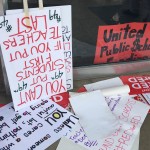Remember how I reminded us to trust, but verify? HB20002 was the first education bill dropped this session. It is a bill outlining a ban against teachers discussing any political issues, court cases, and/or current legislation in school.
I don’t disagree with all aspects of the bill. It prohibits teachers from “engaging in political, ideological or religious advocacy in their classrooms.” The proposed code of ethics would also prohibit endorsing, supporting or opposing a political candidate. These are not things that teachers should be doing in classrooms during the regular school day.
What I find most bothersome about the bill is that it is totally unnecessary. Here’s why- those prohibited actions are already spelled out in Arizona statute – Arizona Revised Statutes Section 1 Title 15 (Education) Chapter 5, Article 1 -505 to be exact.
The problem is that the fallout of this bill would be the suppression of many worthy classroom conversations. Teachers will fear to discuss anything of value for fear of repercussions.
Let’s rewind to the 1980s…as a child, I remember being so bored watching the nightly news with my family. Dan Rather and Tom Brokaw read the facts with a few details used for “color.” They had no agenda to speak of. They read the news and signed off. We experience the news differently today and the ways we consume our news has changed significantly, especially in the past ten years with the advent of social media.
Statutory suppression of voices, such as this bill, feeds extremist thinking. Societal models of productive disagreement and civil discourse are disappearing. Evidence shows that our nation is becoming more politically polarized. Polarization is the tendency for people to have more extreme political views, with fewer people adopting moderate positions. People are self-sorting into groups of people who share similar political views both virtually (online news sources and social media) and in physical communities (residential self-sorting through increasingly segregated neighborhoods and schools). This means Americans are less likely to hear diverse opinions because the “news” we tend to hear is often our own beliefs and values reflected back to us – only more and louder. The Law of Group Polarization explains this rise in extremism, radicalization, cultural shifts, and the behavior of political parties. It describes the formation of the ethnic and racial antagonism and tribalism visible in our culture today by showing how a group of like-minded individuals will move toward extremes within the group. The Law of Group Polarization recognizes social influence on behavior and how “limited argument pools” influence a group.
Discussions and Socratic Seminars are important in helping students understand people who hold different views. John Rawls summed it up perfectly when he said, “In everyday life, the exchange of opinion with others checks our partiality and widens our perspective; we are made to see things from the standpoint of others and the limits of our vision are brought home to us. . . .Discussion is a way of combining information and enlarging the range of arguments.”
Failing to develop civic engagement and empathy can result in serious consequences – for example, being less likely to participate in elements of our democracy, like voting. Research shows that access to civic-learning opportunities is a social justice issue. Access to civic opportunities varies by race, ethnicity, geography, and socio-economic status.
My solution is not to change Arizona statute but to make some recommendations:
- Advocate for more civic learning opportunities for all students.
- Teachers need more and better professional development for teachers to integrate controversial subjects in a bipartisan, objective and non-biased manner.
- Teachers need to engage parents to help them understand the importance of civic education. We must encourage families to engage their students in at-home discussions, which is an indicator of increased civic competencies. We need to emphasize that what we discuss in class and our demeanor is bi-partisan.
Teachers can have an overwhelmingly positive impact on our future by teaching students how to consider multiple viewpoints, and practice empathy and civil discourse. To paraphrase Alexander Hamilton, differences of opinion promote deliberation and circumspection and serve to “check the excesses of the majority.” Let’s move away from extremism and tribalism and return to civil discourse, especially in our classrooms. The future of our country may depend on it.








